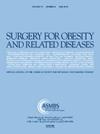接受初级腹腔镜减肥手术的慢性阻塞性肺病患者术后肺部并发症:MBSAQIP分析。
IF 3.5
3区 医学
Q1 SURGERY
引用次数: 0
摘要
背景:最近的研究表明,减肥手术(BaS)对慢性阻塞性肺病(COPD)急性加重的风险有好处。然而,这类患者发生并发症的风险可能会增加,尤其是术后肺部并发症(PPC):目的:分析接受巴氏手术的慢性阻塞性肺病患者的肺部并发症发生率:地点:美国学术医院:我们对代谢与减肥手术认证和质量改进计划数据库进行了回顾性分析,研究对象为2015-2019年期间接受腹腔镜袖带胃切除术和Roux-en-Y胃旁路术的≥18岁患者。研究的主要结果是任何 PPC,定义为复合变量,包括术后肺炎、机械通气 >48 小时和计划外气管插管。对患有和不患有慢性阻塞性肺病的患者进行了单变量分析比较,并进行了多变量逻辑回归以调整混杂因素。对有或无家庭供氧需求的慢性阻塞性肺病患者的终点进行了亚组分析比较:共有 752 722 名患者纳入我们的分析(腹腔镜袖带胃切除术 = 73.2%,Roux-en-Y 胃旁路术 = 26.8%)。2390名患者发生了PPC,其中无慢性阻塞性肺病的患者占0.3%,而有慢性阻塞性肺病的患者占1.3%(P < .001)。多变量分析证实,慢性阻塞性肺病会单独增加发生 PPC 的风险(OR = 1.7,CI = 1.4-2.1)。亚组分析显示,依赖氧气的患者发生 PPC 的风险更高(2.4% 对 1.1%,P < .001):结论:肥胖并伴有慢性阻塞性肺病的患者发生 PPC 的风险更高。结论:肥胖并伴有慢性阻塞性肺病的患者发生 PPC 的几率更高,对氧气的依赖会导致更高的并发症发生率。必须仔细考虑在这类人群中使用 BaS 的风险和益处。本文章由计算机程序翻译,如有差异,请以英文原文为准。
Postoperative pulmonary complications in patients with chronic obstructive pulmonary disease undergoing primary laparoscopic bariatric surgery: an MBSAQIP analysis
Background
Recent research has shown beneficial effects of bariatric surgery (BaS) on the risk of developing acute exacerbations of chronic obstructive pulmonary disease (COPD). However, this patient population may be at increased risk of complications, especially postoperative pulmonary complications (PPC).
Objectives
To analyze the incidence of PPC in patients with COPD undergoing BaS.
Setting
Academic Hospital, United States.
Methods
We performed a retrospective analysis of the Metabolic and Bariatric Surgery Accreditation and Quality Improvement Program database for patients aged ≥18 years undergoing laparoscopic sleeve gastrectomy and Roux-en-Y gastric bypass during 2015–2019. The primary outcome of the study was any PPC, defined as a composite variable including postoperative pneumonia, mechanical ventilation >48 hours and unplanned endotracheal intubation. A univariate analysis was performed to compare patients with and without COPD, and a multivariate logistic regression was performed to adjust for confounders. A subgroup analysis was performed to compare endpoints in patients with COPD with or without home oxygen requirements.
Results
A total of 752,722 patients were included in our analysis (laparoscopic sleeve gastrectomy = 73.2%, Roux-en-Y gastric bypass = 26.8%). PPC occurred in 2390 patients, 0.3% without COPD versus 1.3% with COPD (P < .001). Multivariable analysis confirmed that COPD independently increases the risk of PPC (OR = 1.7, CI = 1.4–2.1). Subgroup analysis showed that patients who are oxygen dependent had a much higher risk for PPC (2.4% versus 1.1%, P < .001).
Conclusion
PPC are higher among patients with obesity and concomitant COPD. Oxygen dependency confers an even higher complication rate. The risk and benefits of BaS in this population must be carefully addressed.
求助全文
通过发布文献求助,成功后即可免费获取论文全文。
去求助
来源期刊
CiteScore
6.70
自引率
12.90%
发文量
570
审稿时长
56 days
期刊介绍:
Surgery for Obesity and Related Diseases (SOARD), The Official Journal of the American Society for Metabolic and Bariatric Surgery (ASMBS) and the Brazilian Society for Bariatric Surgery, is an international journal devoted to the publication of peer-reviewed manuscripts of the highest quality with objective data regarding techniques for the treatment of severe obesity. Articles document the effects of surgically induced weight loss on obesity physiological, psychiatric and social co-morbidities.

 求助内容:
求助内容: 应助结果提醒方式:
应助结果提醒方式:


